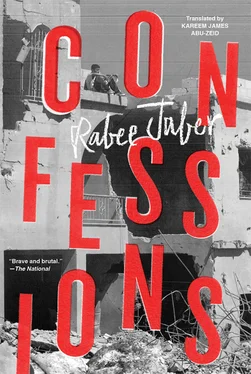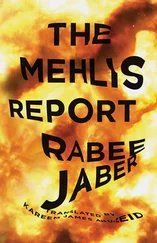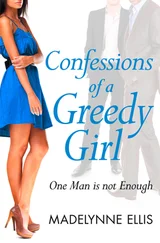Mary washed and folded the clothes. I’d try them on and say: The sleeves are too short. And Mary would reply: We’ll hem the sleeves and fold them over and add buttons, easy. I’d try on a pair of pants and find that the waist was too big. Mary would laugh and say: You’re all skin and bones, even with all those sandwiches you devour you’re still all skin and bones. And then she’d say: You’d better not be playing soccer when our backs are turned! She was always laughing and joking and pinching me, but she’d stop laughing whenever she brought out one of Ilya’s belts. She tightened the belt on me, but she could see it was no use, there weren’t enough holes in the belt. I really was all skin and bones.
Then she’d scowl at me and ask where I learned to lie like that. Again, I’d swear that I wasn’t playing soccer, but I could tell from her face that she didn’t believe me. She’d feel the muscles on my legs and say: These here tell a different story. I said I ran a lot, I loved running, all of us ran a lot. And I’d kick the ground and push her hand away and say: Is running forbidden too?
When I think of those quarrels now, I see that she too acted like my mother. Mary. I remember in ’82, when the planes were shelling West Beirut and the children in the neighborhood climbed onto the rooftops and said: this one hit the Hamra district, and that one hit Kola, and that one hit Mazra. I got hit too: with the measles. My face was covered with red dots and the doctor told me to keep away from people. The doctor warned my siblings and said adults could contract this type of measles too. Was it measles or smallpox? Were the dots red or black-brown? I’d come down with both of them: I had measles once, and smallpox once. You could call me a repository of diseases. I used to get nosebleeds sometimes too, but not very often. My nose would start bleeding whenever I played in the sun a lot. One time I got a nosebleed and sat down on the sidewalk in front of Mousa al-Zayyat’s store (he used to sell us Arabic “ice cream” and claim it was the best in Achrafieh — it was a mix of water, ice, and coloring, and you could crunch it between your teeth). He came out and gave me a tissue, telling me to press down hard on my nose, right at the top of the bone, and he stretched out his hand — it was as small as a girl’s, and also soft and damp, giving me the chills — and with his tiny fingers taught me how to press on the bone between my eyes to stop the bleeding. Raise your other hand, he said, and I raised it up high. Wait a bit now, he said, and the bleeding will stop. I asked him what would happen if it didn’t stop. He replied: If the bleeding doesn’t stop, you’ll die. I remember the exact words he used: “You’ll die.” He said I’d die if the bleeding didn’t stop. Years later, during the War of Elimination (1990), a burst of gunfire hit him in the liver.
While I was sick in ’82, the bed shook beneath me whenever the planes flew over our house. Mary and my mother were worried about me. Whenever my mother was sleeping (if she’d taken her medication), Mary would be at my side. And when my father or Ilya came home (from the “lines” or the port or the Phalangist headquarters), they’d approach my bed. Ilya wasn’t scared of the measles because he’d had them when he was young and was immune now. He’d draw near, put his palm on my forehead, and say I was burning up, smiling as he did so. My father would ask my sister when my fever had risen, and Mary would reach for the thermometer on the table by the bed, touch it, and say: Just a moment ago, or fifteen minutes ago, or a half-hour ago. Are you wondering how I remember all of this as if it happened yesterday, and not twenty-six years ago?
I haven’t forgotten the din of the warplanes. One time, as I was dragging my heavy head along the pillow (the itching sensation was awful, and they’d tied my hands so I wouldn’t scratch my face), I saw a plane beyond the window, and watched the plane’s shadow pass over me. The sun was shining on the metal, shining on the glistening silver. And the sound, the horrifying roar. Did I say I was only afraid of being kidnapped? Did I say the shelling wasn’t paralyzing, and the roar of the planes wasn’t terrifying? That wasn’t true. I was afraid of many things. How could I not be afraid when I was so young and my drugged mother was always sleeping? How could I not feel fear when neither my father nor my brother ever stayed at home? And then there was Liliane, who was always crying in the bathroom. Whenever she heard shelling she’d rush to the bathroom, lock the door, and start crying…. When I think about Liliane, I think of how she spent fifteen years in the bathroom. Poor Liliane. Even when they were shelling West Beirut, she’d hear the explosions and think they were shelling East Beirut (it wasn’t very far away, the only thing that separated us from them was the demarcation line) and rush to the bathroom. When I see Liliane’s daughter now (did I tell you her name? — her name’s Nathalie), I think I’m looking at Liliane, but there’s one difference: that young girl doesn’t look scared all the time.
Why is one person afraid when another isn’t? Ilya left the house during the Mountain War in 1983. We knew that he and his friends were involved in the fighting, that they were moving around between the Shouf and Matn districts, but we didn’t tell mother. When she asked us, we said he’d just gone out to buy bread. She’d fall asleep and when she woke up (she wasn’t completely awake, her eyes would water as if there were rainclouds in them) she’d ask if Ilya had come back from the market, if he’d found any bread. And we’d say yes, he’d come back: “Here, eat this bite… Ilya just bought this fresh bread, he bought it just now.” She’d ask us where he was. And we’d reply that he was on guard duty at Sassine Square, or that he’d gone to a friend’s house, or that he was down at the port looking for our father. She’d ask us why we hadn’t woken her. We’d say he’d sat beside her bed, waiting for her to wake up. Then my mother would eat a bit of labneh from my sister’s hand and say she’d felt him, she’d felt his hand on her head.
Was Ilya not afraid? He told me countless stories about the Mountain War. A strange look would pass across his face when he spoke, and it felt like he was testing me, it felt like he wanted me to say something. But what? He asked me not to tell the family what he was up to. This stays between us, he’d say. But I didn’t really understand what he meant by that. I understood half of it — and I thought I understood it all. Later, I’d remember those times when we were sitting on the roof, beneath the thatched shelter, and realize he’d meant something else entirely.
I clung to him back then. Before that, when I saw him taking care of mother, I’d begun to love him. No, I loved him from the beginning: he was my big brother, how could I not love him? Once, when I was out in the street, he hit a boy who had pushed me. That happened early on, before the Hundred Days War, or maybe shortly afterward, I’m not sure. Was it before ’79? He used to provoke me in the house. He did it secretly, behind my parents’ backs. There were times when he pushed me while my sisters were watching, but he never did that in front of mother or father. He kept going after me during those first few years — his mood would change suddenly, one moment he was an angel, the next a devil. But most of the time he was going after me. That’s why I remember what happened so clearly, it was the very first time I really believed he loved me. Can you imagine? For years I’d been saying: That’s my big brother, and of course he loves me like I love him, for years I’d been saying that without actually being sure of it — until I saw him hit that boy. We were playing in the street. Ilya was leaving a store and saw the boy push me, throw me to the ground, and kick me. I’d fallen on the asphalt, and out of the corner of my eye I caught sight of Ilya approaching quickly, a paper bag in his hand. I can still remember that coarse brown bag — can you believe it? We used to buy vegetables and put them in paper bags, before everyone started using plastic. He handed the bag to one of the kids, approached the boy who’d hit me, and said something to him. I was on the ground. I heard Ilya say the boy’s name, and swear at him. I remember the swear word. And I remember how the boy screamed. Ilya grabbed his shirt, tearing it, and hit him. The boy’s face started bleeding. I remember him screaming, “My tooth!” Is that memory real? I know all of it happened, and yet — after all this time, after everything I’ve learned and found out — I sometimes still mistrust my memories. But I remember Ilya lifting me off the ground, brushing the dirt off my clothes, and wiping my nose on his sleeve. I remember him looking at my shocked face and saying: “Don’t play with them if you’re going to cry.”
Читать дальше












